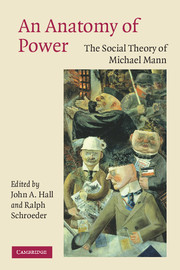Book contents
- Frontmatter
- Contents
- List of figures
- List of contributors
- 1 Introduction: the IEMP model and its critics
- Part I Theory, practice, method
- Part II Types of power
- Part III European exceptionalism?
- 10 From theory to history: ‘The European Dynamic’ or feudalism to capitalism?
- 11 The rise of the West
- 12 A historical, not comparative, method: breakthroughs and limitations in the theory and methodology of Michael Mann's analysis of power
- Part IV Promise and perils of modernity
- Part V Response
- Bibliography of Michael Mann's Writings
- Index
- References
10 - From theory to history: ‘The European Dynamic’ or feudalism to capitalism?
Published online by Cambridge University Press: 22 September 2009
- Frontmatter
- Contents
- List of figures
- List of contributors
- 1 Introduction: the IEMP model and its critics
- Part I Theory, practice, method
- Part II Types of power
- Part III European exceptionalism?
- 10 From theory to history: ‘The European Dynamic’ or feudalism to capitalism?
- 11 The rise of the West
- 12 A historical, not comparative, method: breakthroughs and limitations in the theory and methodology of Michael Mann's analysis of power
- Part IV Promise and perils of modernity
- Part V Response
- Bibliography of Michael Mann's Writings
- Index
- References
Summary
Introduction Mann's post-modern enlightenment conception
Michael Mann's notion of ‘The European Dynamic’ lies at the heart, and is the ultimate payoff, of his enquiry into the sources of social power. It constitutes his account of the emergence of both the modern agro-industrial economy and the modern centralized state and international system of multiple states, in terms of what he understands to be the four networks and sources of social power. But, from the outset, one is obliged to confront a conundrum. There appears to be a yawning gap between Mann's explicit theoretical commitments and his practical historical account of the rise of the West.
In introducing his general theoretical approach, Mann delivers a stern warning of the dangers of attributing too much coherence to societies as a whole, the sort of jeremiad as to the perils of reification of concepts that has long been the meat and drink of post-structuralism fading into post-modernism. ‘[M]ost sociological orthodoxies’, he asserts, ‘mar their insights by conceiving of “society” as an unproblematic, unitary totality’ (1986: 2). In fact, argues Mann, ‘We can never find a single bounded society in geographical or social space’ (1). Societies, he insists, ‘are not social systems; they are not totalities’ (1). ‘Because there is no totality, individuals are not constrained in their behavior by social structure as a whole’ (1–2). We therefore have no reason to expect, by way of the aggregation of the social-structurally constrained actions of the society's component individuals, the emergence of system-wide patterns of development.
- Type
- Chapter
- Information
- An Anatomy of PowerThe Social Theory of Michael Mann, pp. 189 - 232Publisher: Cambridge University PressPrint publication year: 2006
References
- 7
- Cited by

